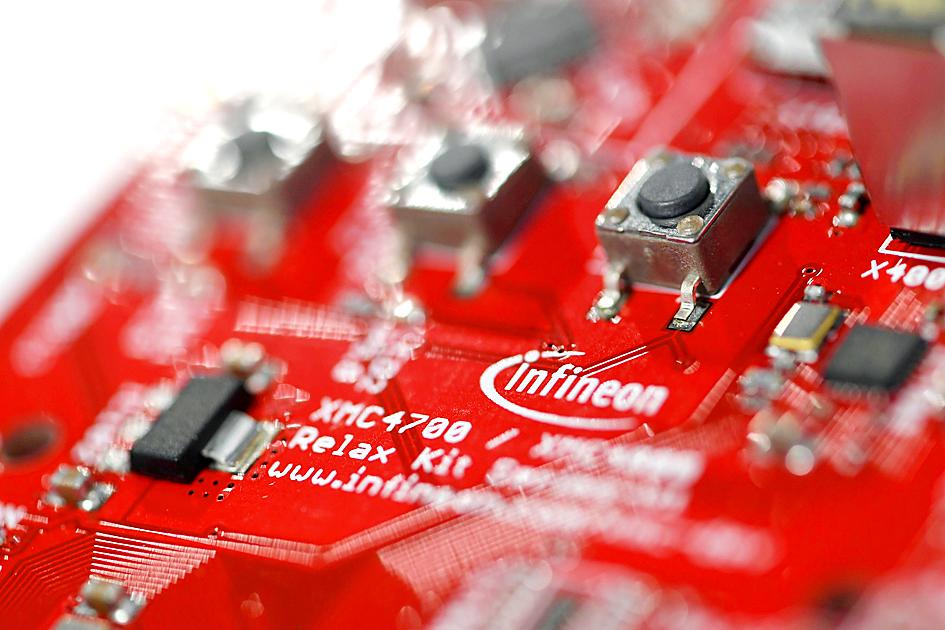German semiconductor producer Infineon Technologies AG on Tuesday said that microchip supply bottlenecks could continue into next year, in a blow to the auto industry.
“We predict that the imbalance between supply and demand will continue for a few quarters yet, with the risk that it lasts into 2022,” Infineon chief executive Reinhard Ploss said in a virtual news conference.
He added that the “bottlenecks” are a particular problem for the Munich-based company in areas where they do not produce the chips themselves, but buy them from subcontractors to equip microcontrollers for vehicles or smart appliances.

Photo: Reuters
The auto industry remains plagued by “severe delivery problems,” amid a rise in demand driven by a boom in electric vehicles, Ploss said.
Infineon, which plans to finish construction on a new chip production site in Austria later this year, has profited early this year from a booming semiconductor market.
“Electronics that help accelerate the energy transition and make work and home life easier remain in high demand,” Ploss said. “The push for digitalization continues unabated.”
While the surge in demand for electronic devices during the COVID-19 pandemic has helped chipmakers, it has also led to a semiconductor supply crunch in the auto industry, where chips are a key element in modern vehicles.
The shortage of chips has pushed many automakers to idle production lines for brief periods when they temporarily run out of supplies.
Infineon marketing director Helmut Gassel said that the shortage affected the production of about 2.5 million cars in the first quarter of this year.
The company reported sales of 2.7 billion euros (US$3.24 billion) in the first quarter, compared with analysts’ average estimate of 2.69 billion euros.
Infineon previously guided for second-quarter revenue of 2.5 billion euros to 2.8 billion euros, and third-quarter revenue of 2.6 billion euros and 2.9 billion euros.
The company predicted full-year revenue guidance of about 11 billion euros.
Infineon said its second-quarter revenues were particularly strong in its automotive segment.

Zhang Yazhou was sitting in the passenger seat of her Tesla Model 3 when she said she heard her father’s panicked voice: The brakes do not work. Approaching a red light, her father swerved around two cars before plowing into a sport utility vehicle and a sedan, and crashing into a large concrete barrier. Stunned, Zhang gazed at the deflating airbag in front of her. She could never have imagined what was to come: Tesla Inc sued her for defamation for complaining publicly about the vehicles brakes — and won. A Chinese court ordered Zhang to pay more than US$23,000 in

Taiwan Semiconductor Manufacturing Co (TSMC, 台積電) yesterday said that its investment plan in Arizona is going according to schedule, following a local media report claiming that the company is planning to break ground on its third wafer fab in the US in June. In a statement, TSMC said it does not comment on market speculation, but that its investments in Arizona are proceeding well. TSMC is investing more than US$65 billion in Arizona to build three advanced wafer fabs. The first one has started production using the 4-nanometer (nm) process, while the second one would start mass production using the

US President Donald Trump has threatened to impose up to 100 percent tariffs on Taiwan’s semiconductor exports to the US to encourage chip manufacturers to move their production facilities to the US, but experts are questioning his strategy, warning it could harm industries on both sides. “I’m very confused and surprised that the Trump administration would try and do this,” Bob O’Donnell, chief analyst and founder of TECHnalysis Research in California, said in an interview with the Central News Agency on Wednesday. “It seems to reflect the fact that they don’t understand how the semiconductor industry really works,” O’Donnell said. Economic sanctions would

‘NO DISRUPTION’: A US trade association said that it was ready to work with the US administration to streamline the program’s requirements and achieve shared goals The White House is seeking to renegotiate US CHIPS and Science Act awards and has signaled delays to some upcoming semiconductor disbursements, two sources familiar with the matter told reporters. The people, along with a third source, said that the new US administration is reviewing the projects awarded under the 2022 law, meant to boost US domestic semiconductor output with US$39 billion in subsidies. Washington plans to renegotiate some of the deals after assessing and changing current requirements, the sources said. The extent of the possible changes and how they would affect agreements already finalized was not immediately clear. It was not known